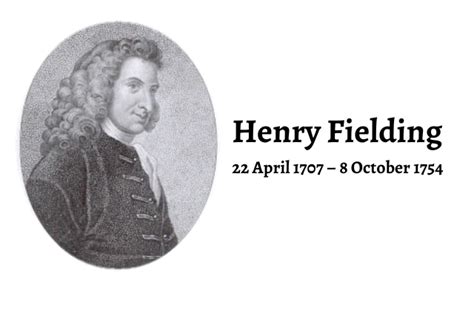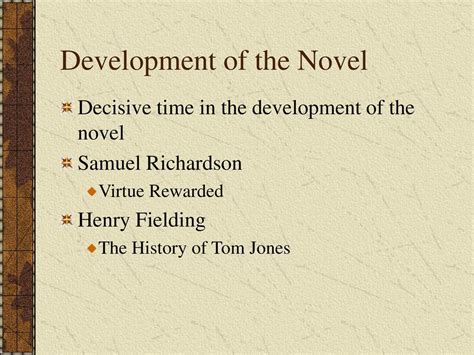In this article, we will delve into the fascinating world of one of the most renowned English novelists of the 18th century, Henry Fielding. Known for his satirical wit and keen insight into human nature, Fielding's works have left an indelible mark on English literature. Join us as we uncover the life, works, and legacy of this literary giant.
Henry Fielding was a prolific writer whose career spanned various genres, from novels and plays to political satire and essays. His most famous works include "Tom Jones" and "Joseph Andrews," which are considered masterpieces of English literature. Fielding's unique blend of humor, social commentary, and intricate character development set him apart from his contemporaries and established him as a literary luminary.
Throughout his life, Fielding faced numerous challenges and setbacks, including financial difficulties and health problems. Despite these obstacles, he continued to write and publish works that captivated audiences and earned him widespread acclaim. His keen observations of society and human behavior continue to resonate with readers to this day, making him a timeless figure in the world of literature.
Early Life and Education of Henry Fielding

In this section, we will delve into the formative years of the renowned English novelist and playwright, Henry Fielding. We will explore his upbringing, family background, and the educational experiences that shaped his future career as a literary figure.
Family Background: Henry Fielding was born on April 22, 1707, in Sharpham Park, Somerset, England, into a prominent family with aristocratic connections. His father, Edmund Fielding, was a well-respected army officer, and his mother, Sarah Gould, came from a distinguished family of the gentry.
Educational Experiences: Fielding received his early education at Eton College, where he excelled in classical studies and literature. He later attended the University of Leiden in the Netherlands, where he studied law and developed a keen interest in drama and storytelling. These formative years laid the foundation for Fielding's future as a prolific writer and playwright.
Literary Influences on Henry Fielding
In order to truly understand the works of Henry Fielding, it is essential to explore the literary influences that shaped his writing style and themes. Fielding was deeply influenced by a variety of literary works and authors from different time periods, whose ideas and techniques helped mold his own unique storytelling approach.
Henry Fielding's Contributions to English Literature

Henry Fielding made significant contributions to English literature through his innovative techniques in writing, his insightful social commentary, and his creation of complex and memorable characters. Fielding's works continue to be studied and appreciated for their wit, humor, and keen observations on society.
The Social and Political Context of Fielding's Works
In order to fully understand Henry Fielding's works, it is important to consider the social and political context in which he was writing. Fielding lived during a time of significant social change and political turmoil in England, and his works often reflect the issues and debates of his day.
Social Issues: Fielding's writings often explore themes such as poverty, crime, class divisions, and moral decay. He was deeply concerned with the social issues of his time and used his work to critique the injustices and inequalities he saw in society.
Political Climate: Fielding also lived during a time of intense political upheaval, with debates raging over issues such as corruption, censorship, and the role of government. His writings often engage with these political debates, offering a satirical commentary on the state of the nation.
Influence on Fielding's Works: By understanding the social and political context of Fielding's works, readers can gain deeper insights into his themes, characters, and narrative techniques. Fielding's works are not just entertaining stories; they are also complex reflections of the world in which he lived.
Fielding's Satirical Approach to Writing

Henry Fielding became known for his satirical approach to writing, using humor and wit to criticize the societal norms of his time. Through his works, Fielding cleverly mocked the political corruption, moral decay, and hypocrisy he observed in 18th-century England.
| Examples of Fielding's Satirical Works: |
|---|
| 1. "The History of Tom Jones, a Foundling": Fielding satirizes the class system and social hierarchy by following the adventures of a foundling navigating the complexities of society. |
| 2. "Jonathan Wild": Fielding parodies the notorious criminal of the same name to comment on the unjust legal system and the exploitation of power. |
| 3. "Shamela": A parody of Samuel Richardson's "Pamela," Fielding humorously deconstructs the sentimental novel and its portrayal of virtuous female characters. |
Analysis of Fielding's Most Famous Novels
In this section, we will take a closer look at some of Henry Fielding's most famous novels and analyze the themes, characters, and writing style that made him a prominent figure in English literature.
We will delve into the intricate plots of "Tom Jones" and "Joseph Andrews", examining how Fielding skillfully weaves together complex narratives with humor and satire to provide insightful commentary on society and human nature.
Additionally, we will explore the moral and ethical dilemmas presented in Fielding's works, as well as the realistic and relatable characters that populate his novels, shedding light on his keen observation of human behavior and emotions.
By the end of this analysis, you will gain a deeper understanding and appreciation for Henry Fieldin
Fielding's Impact on the Development of the Novel

Henry Fielding was a significant figure in the history of the novel, contributing to its development in various ways. His innovative storytelling techniques and insightful portrayal of society set a new standard for the genre.
| 1 | Fielding's use of irony and satire |
| 2 | Exploration of complex characters and moral dilemmas |
| 3 | Introduction of elements of suspense and mystery |
Legacy of Henry Fielding in Modern Literature
The influence of Henry Fielding in modern literature can be seen in various ways, from his innovative storytelling techniques to his satirical commentary on society. His works continue to inspire authors today, serving as a foundation for the development of the novel as a genre.
Fielding's emphasis on character development and social criticism can be seen in contemporary literature, with many authors drawing inspiration from his work to create complex and morally ambiguous characters. Additionally, his use of humor and wit to critique societal norms remains a popular technique in modern storytelling.
FAQ
Who was Henry Fielding?
Henry Fielding was an English novelist and playwright who lived in the 18th century. He is best known for his novel "Tom Jones", which is considered one of the greatest works in English literature.
What were some key themes in Henry Fielding's works?
Some key themes in Henry Fielding's works include social issues, morality, justice, and the human condition. He often used satire and humor to address these themes in his writing.
How did Henry Fielding's background influence his writing?
Henry Fielding's background as a lawyer and magistrate influenced his writing, as he often wrote about legal and social issues. His experiences in the legal system also provided him with firsthand knowledge of the injustices of society.
What was the significance of Henry Fielding's novel "Tom Jones"?
"Tom Jones" is significant because it is considered one of the first examples of the modern novel. It is known for its complex plot, realistic characters, and social commentary, making it a groundbreaking work in the history of literature.
How did Henry Fielding's writing style differ from other writers of his time?
Henry Fielding's writing style was unique in that he combined realism with humor and satire. He often used intricate plots and rich character development to explore social issues in a way that was both entertaining and thought-provoking.
Who was Henry Fielding?
Henry Fielding was an English novelist and playwright known for his satirical works, including "Tom Jones" and "Joseph Andrews". He was also a magistrate and is considered one of the founders of the English novel.
What are some of Henry Fielding's most famous works?
Some of Henry Fielding's most famous works include "Tom Jones", which is considered one of the greatest English novels, and "Joseph Andrews", which is a parody of the picaresque novel. Fielding also wrote plays and essays that satirized the social and political issues of his time.



